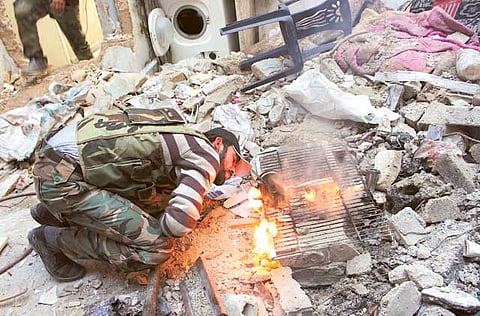Half of Syria living in poverty: UN
Economic devastation wrought by the conflict could be felt for years to come

Damascus: Syria’s war has destroyed livelihoods and collapsed the economy, leaving more than half the country’s population in poverty, according to a report commissioned by UN agencies this month.
Some 115,000 people have been killed and millions displaced since the war broke out in 2011, and the report warned that the economic devastation wrought by the conflict could be felt for years to come.
“More than half the population now live in poverty, with 7.9 million people becoming poor since the beginning of the crisis, of whom 4.4 million now live in extreme poverty,” the report said.
Unemployment has soared to 48.6 per cent, education in Syria “is in the midst of a silent disaster” with 49 per cent of children out of school, and the health sector faces “significant collapse,” it warned.
Syria’s Gross Domestic Product (GDP) is in a state of “spectacular collapse,” the report said, having contracted by 34.3 per cent in the first quarter of 2013, and 39.6 per cent in the second, compared to 2012.
“The Syrian economy experienced massive de-industrialisation as a result of business closure and bankruptcy, capital flight, looting and destruction,” it said.
By the first quarter of 2013, the country had suffered a total economic loss of $103.1 billion, which is equivalent to 147 per cent of Syria’s 2010 GDP at constant prices.
The war has also spawned black markets and criminal activity, as well as “economies of violence that will plague post-conflict economic regulation,” the report said.
“Increasingly, business people are operating in markets punctuated by economies of violence, where racketeering, extortion, smuggling and criminality encroach on legitimate businesses and endanger the welfare of ordinary business folk,” it added.
The war’s distortion of the labour market has, meanwhile, forced many ordinary people to seek jobs in smuggling, extortion, kidnapping and looting to survive, despite the dangers.
The economy has also suffered from the flight of skilled workers and capital, with agriculture having risen to an “unprecedented” 54 per cent share of GDP.
The report was commissioned by the UN Development Fund and the UN Relief and Works Agency for Palestinian Refugees, and was prepared by the Damascus-based Syrian Centre for Policy Research.
The report’s findings focus on the period covering April to June 2013.


